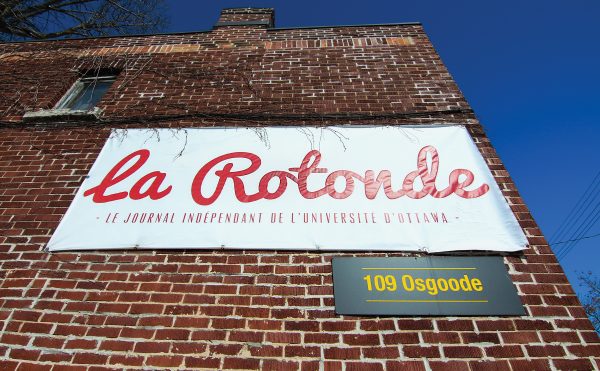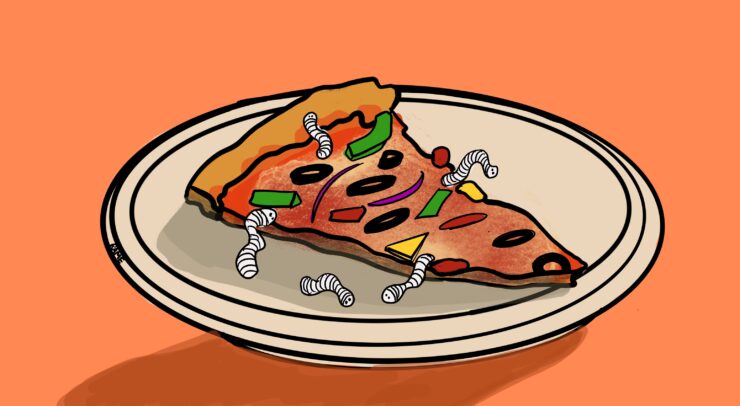Services affected include ombudsperson, clubs, financial and legal aid, student government, campus media
About three in four students on average opted-in to campus services deemed ‘non-essential’ under the Student Choice Initiative (SCI) for the fall semester, data released by the University of Ottawa Students’ Union (UOSU) on Tuesday reveals.
The SCI was introduced at the start of this semester by the provincial government. Under the policy, U of O students can opt-out of funding support for refugee students, the legal aid clinic, student life, the ombudsperson, student media, and the Ontario Public Interest Research Group (OPIRG).
The UOSU’s student life fee — used to fund recognized student governments, clubs, 101 Week, and most service centres — received the highest opt-in rate at just below 79 per cent of students. Still, that translates to about $155,000 in lost funding.
“It’s obviously not ideal, it’s still 20 per cent less than what (we) would have had last year to work with,” said UOSU advocacy commissioner Sam Schroeder. “But in terms of finding efficiencies, it makes it fairly easy to bridge that gap.”
Some recognized student governments also have a separate fee on top of the funding they receive through the UOSU. Schroeder said some have been reporting opt-in rates as high as 90 per cent.
Schroeder said the union budgeted for a 70 per cent opt-in rate and the extra funding they received will most likely be put toward boosting funding for clubs.
“I’m just glad students recognized the value in all this,” said Schroeder.
The OPIRG is in the middle of the pack when it comes to financial support from students, with just over a 75 per cent opt-in rate. The organization raises awareness and support projects on environmental concerns, poverty, colonization and accessibility.
“We’re glad that the cuts weren’t worse but we’re not jumping for joy about a 25 per cent budget cut — nobody would,” said OPIRG actions groups coordinator Ronda Brooks.
Under the SCI, OPIRG is losing about $32,750 in funding this semester. In preparation, the team cut four positions, including the financial coordinator, research coordinator, the campus outreach position, and the Indigenous relations position. They’ve also postponed creating student research projects.
“We’re very discouraged that the provincial government did not consult with universities and students and other stakeholders about these drastic cuts,” said Brook.
About 73 per cent of students opted-in to La Rotonde, the French-language newspaper on campus, equivalent to about a $30,000 loss in funding.

General manager Mathieu Tovar-Poitras said the paper projected a 75 per cent opt-in rate and plans to transition to a solely online publication in December to cut costs, which leaves them in a comfortable position — for now.
“We might get a completely different (opt-in) rate in the winter,” said Tovar-Poitras. “I’m hoping once we get the numbers in winter and summer 2020, we’ll have an idea of how much we can expect in the long run.”
The issue there for Tovar-Poitras is work contracts: with fluctuating opt-in numbers, he says it will be more difficult to guarantee a year’s worth of pay for staff members in the future. It could also make working for the publication less attractive, he added.
“Right now we’re living year by year,” said Tovar-Poitras. “It could eventually become semester to semester.”
To convince those who did opt-in to stick around and to bring on those who didn’t, La Rotonde plans to help readers better connect with their staff by visiting classrooms and having the team hand out copies of the paper on campus “to have a physical connection with students.”
CHUO 89.1 FM, the U of O’s campus radio station, received the lowest opt-in rate out of optional services at around 72 per cent of students. That translates into a funding loss of around $45,000.
“When (the SCI) was announced … we were already in the process of transforming our organization, so it accelerated that process,” said station manager Erin Flynn.

CHUO budgeted for between 40 to 60 per cent of students opting-in, leading the organization to not fill a full-time position and not renew a few expired contracts, said Flynn.
“That is good, better than I expected,” she said of the opt-in rate. “I just wasn’t sure (where students fell) in terms of even understanding what radio is anymore and how important it is for student life and students at large.”
Flynn said working on boosting their connection with students is an ongoing priority for CHUO. The radio station partnered with the UOSU during 101 Week to take part in events and is investing in developing podcasts.
“We’re making sure … what we’re putting on air speaks to (students),” Flynn said. “It’s about maintaining and building on that connection, finding new and different ways to collaborate.”
The opt-in period for the winter semester ends on Jan. 31, 2020 and opt-in numbers will likely be released at the start of February.
Read More:
- Province announces 10 per cent domestic tuition cut, slashes low-income grant
- U of O campus organizations face financial uncertainty as opt in deadline nears
- Provincial government unveils 2019 budget, announces changes to funding
Disclosure: The Fulcrum is working with CHUO on a soon-to-be-released podcast called One in Five.
Editor’s Note (4/10/19, 10:12 a.m.): A previous version of this article stated the UOSU budgeted for 75 per cent of students opting-in to the student life fee. In fact, they budgeted for 70 per cent of students opting-in.





